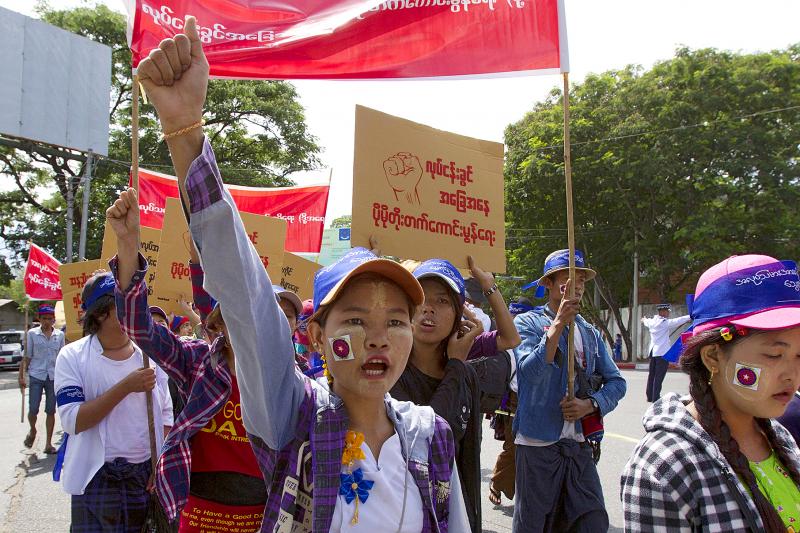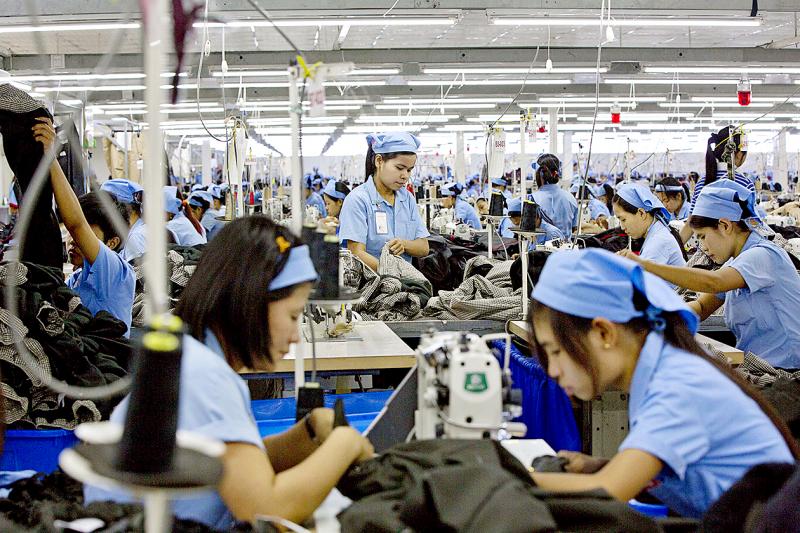At a garment factory on the outskirts of Myanmar’s biggest city, Zin Mar Htun has been working through the night — doing unpaid overtime in a desperate attempt to keep her job.
Myanmar’s clothing factories have cut more than 250,000 jobs since the military seized power in a Feb. 1 coup, unleashing economic turmoil and triggering sanctions against the ruling generals that anti-junta protesters want to see extended.
Trade unions, which have been at the fore of protests since the coup, are urging foreign fashion firms and governments to sever trade ties to pressure the military, though many low-paid garment workers like Zin Mar Htun fear they would pay the price.

Photo: AP
“It is possible to live and eat only because there are factories,” Zin Mar Htun said during a rare day off from sewing clothes at a plant that supplies European fashion labels.
“Without this job, I would become a beggar. I know nothing but sewing,” she said, adding that her monthly salary had dropped to 180,000 kyat, about US$100, since bosses stopped paying for overtime.
A survey of 400 workers — 290 from garment and shoe factories, some of them already unemployed — found 97 percent did not support the unions’ campaign for broader sanctions, according to the Workers’ Solidarity League of Burma, a nonprofit.

Photo: AP
Heeding the demands of unions and rights groups for tougher action, the European Parliament called in October for a swift review of EU trade benefits that helped Myanmar’s garment exports skyrocket over the last decade.
Aided by the bloc’s Everything But Arms (EBA) trade scheme, which allows tax-free exports from developing countries, the sector made up 30 percent of all exports in 2019, worth US$6.5 billion, and up from less than US$1 billion in 2011, UN data shows.
Critics say EBA status, which is granted to countries committed to protecting human rights, no longer applies to Myanmar following the death of an estimated 1,200 civilians since Feb. 1 and worsening labor conditions.
“The coup reversed the progress made during the democratization process, thereby undermining the conditions for granting EBA references,” the EU Parliament said in an Oct. 7 resolution.
RIGHTS ROLLBACK
Before the military deposed Nobel Laureate Aung San Suu Kyi, who was jailed last week on charges of incitement and breaching COVID-19 rules, Myanmar’s garment factories employed some 700,000 people — mostly young women supporting rural families.
Since the coup, union leaders from the sector have used established networks to mobilise workers in strikes and protests.
In a sector already reeling from the coronavirus pandemic, factory zones have been placed under martial law and attacked by arsonists, and unionists have been targeted as 10 years of hard-won labor rights are rolled back, labor campaigners said.
More than 250,000 jobs were lost in the first half of this year and hours were slashed by more than half for those who remained, according to the UN’s labor agency, the International Labour Organization (ILO).
In the economic and political chaos, the interests of some factory bosses and the military have aligned, campaigners said, citing reports of them collaborating to root out union leaders and other organizers.
“(Workers are) being dragged out of their homes in the middle of the night to be arrested and those in military or police custody are being brutally tortured even to the point of death,” global union IndustriALL wrote to the European Commission.
The military junta could not immediately be reached for comment.
The Geneva-based union federation has also backed a campaign by more than 180 Myanmar unions and civil society groups for foreign governments and companies to cut all economic ties with the country.
One of the campaign’s leaders, Khaing Zar Aung, president of the Industrial Workers Federation of Myanmar, said the potential for mass job losses was outweighed by the millions of people who were already “starving” due to the coup’s economic impact.
In April, the UN warned that up to 12 million people could be pushed into poverty by next year — levels not seen since 2005 — with Myanmar “on the brink of economic collapse.”
Khaing Zar Aung, also a central committee member of the Confederation of Trade Unions Myanmar, which she said voted unanimously in support of sanctions, dismissed the survey of 400 workers who were almost all against the measures.
“I can get 4,000 or 40,000 signatures of workers who agreed,” she said by phone from Germany, outlining plans to collect donations to support those put out of work if tougher sanctions come into force. “We are doing what we believe.”
’RACE TO THE BOTTOM’
But critics say deeper economic sanctions could do irreversible damage to the sector and put workers at further risk.
Fashion labels that have helped drive improvements in labor conditions would likely be among the first to pull out, said Richard Horsey, a former ILO representative in Myanmar. “Those brands that have higher standards would be stripped out of the market and it would become a race to the bottom,” he said.
Producers with less concern for labor rights would likely fill the vacuum, as Western labels shift production to competitors such as China, Cambodia or Bangladesh — a potential death knell for the industry, he said.
European labels H&M, Marks & Spencer and Primark said they were committed to Myanmar workers, as the Ethical Trade Initiative, a UK-based supply chain watchdog, conducts an assessment of current conditions in the country The report is due to be completed early next year.
“In the meantime, we remain committed to all orders and our current suppliers,” a Primark spokesperson said.
At the Roo Win factory in Yangon, which also supplies European fashion labels, lunch breaks have been slashed to 15 minutes, said Nyo Nyo Tan, a machine operator.
Staff are threatened and harassed if they fail to meet rising production targets, and union leaders and other dissenters had been fired by factory bosses, she added.
But she said working under deteriorating conditions was better than not working at all.
“We rely on (business from) other countries,” she said, adding that she was not aware of the sanctions campaign. “I would like to request that brands do not leave.”

In the March 9 edition of the Taipei Times a piece by Ninon Godefroy ran with the headine “The quiet, gentle rhythm of Taiwan.” It started with the line “Taiwan is a small, humble place. There is no Eiffel Tower, no pyramids — no singular attraction that draws the world’s attention.” I laughed out loud at that. This was out of no disrespect for the author or the piece, which made some interesting analogies and good points about how both Din Tai Fung’s and Taiwan Semiconductor Manufacturing Co’s (TSMC, 台積電) meticulous attention to detail and quality are not quite up to

April 21 to April 27 Hsieh Er’s (謝娥) political fortunes were rising fast after she got out of jail and joined the Chinese Nationalist Party (KMT) in December 1945. Not only did she hold key positions in various committees, she was elected the only woman on the Taipei City Council and headed to Nanjing in 1946 as the sole Taiwanese female representative to the National Constituent Assembly. With the support of first lady Soong May-ling (宋美齡), she started the Taipei Women’s Association and Taiwan Provincial Women’s Association, where she

Chinese Nationalist Party (KMT) Chairman Eric Chu (朱立倫) hatched a bold plan to charge forward and seize the initiative when he held a protest in front of the Taipei City Prosecutors’ Office. Though risky, because illegal, its success would help tackle at least six problems facing both himself and the KMT. What he did not see coming was Taipei Mayor Chiang Wan-an (將萬安) tripping him up out of the gate. In spite of Chu being the most consequential and successful KMT chairman since the early 2010s — arguably saving the party from financial ruin and restoring its electoral viability —

It is one of the more remarkable facts of Taiwan history that it was never occupied or claimed by any of the numerous kingdoms of southern China — Han or otherwise — that lay just across the water from it. None of their brilliant ministers ever discovered that Taiwan was a “core interest” of the state whose annexation was “inevitable.” As Paul Kua notes in an excellent monograph laying out how the Portuguese gave Taiwan the name “Formosa,” the first Europeans to express an interest in occupying Taiwan were the Spanish. Tonio Andrade in his seminal work, How Taiwan Became Chinese,